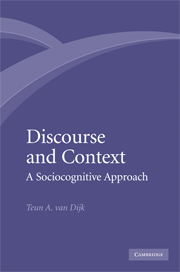3 - Context and cognition
Published online by Cambridge University Press: 22 September 2009
Summary
Introduction
One of the main theses of this study is that contexts are not some kind of objective social situation, but rather a socially based but subjective construct of participants about the for-them-relevant properties of such a situation, that is, a mental model. This chapter provides further details about this claim by developing a theory of context models as a special kind of everyday experience model, represented in the episodic memory of discourse participants. Such context models are assumed to control many aspects of the production and understanding of text and talk. This means that language users are not just involved in processing discourse; at the same time they are also engaged in dynamically constructing their subjective analysis and interpretation of the communicative situation on line.
There is ample psychological work on context properties, and in the study of discourse processing (Graesser, Gernsbacher and Goldman, 2003). However, we as yet do not have an overall cognitive theory of context as a type of mental model. Indeed, most psychological work that uses the term "context" in fact deals with what is called verbal context or "co-text," that is, the part of a discourse that is the environment of other parts (see, e.g., Cook and Myers, 2004, 268–288).
Information
- Type
- Chapter
- Information
- Discourse and ContextA Sociocognitive Approach, pp. 56 - 110Publisher: Cambridge University PressPrint publication year: 2008
Accessibility standard: Unknown
Why this information is here
This section outlines the accessibility features of this content - including support for screen readers, full keyboard navigation and high-contrast display options. This may not be relevant for you.Accessibility Information
- 4
- Cited by
